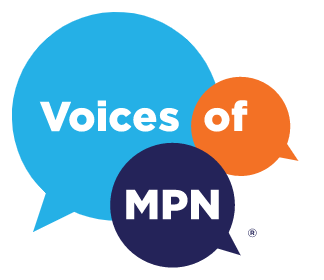Why Your Mental Health Matters

Author: Voices of MPN
If you or someone you care about is affected by a rare, chronic blood cancer like a myeloproliferative neoplasm (MPN), you probably already know how important it is to keep track of physical symptoms and how they may be changing over time. But did you know that it’s also important to monitor how your MPN affects your
well-being? That’s because your emotional symptoms are just as important as your physical symptoms, as they can both impact your quality of life.
SPEAK UP—AND SPELL OUT—HOW YOUR MPN MAKES YOU FEEL
Whether you are an MPN patient or caregiver, we all have good days and bad days. And although every MPN journey is different, it’s normal—and even somewhat expected—to experience feelings of emotional distress from time to time. Unfortunately, keeping those feelings to yourself can cause additional distress, which can have an impact on your health, your relationships, as well as your ability to function and focus. That’s why it’s important to take action by putting a plan in place to help you cope—and to ensure that you have access to the care and support that you may need.
- Get the facts—learning more about your MPN can help you understand what to expect and can help you have more productive, informed conversations with your healthcare team about your ongoing care management plan
- Solidify your support system—whether it’s a support group, a healthcare professional, or just friends and family, it’s important to identify people you can talk to and trust with your feelings
- Consider asking your MPN healthcare team for information about support resources designed for individuals with chronic diseases. This may include printed or online educational materials, MPN support/advocacy groups, counselors, and more
- Don’t withhold important information about how you’re feeling. Get into the habit of regularly documenting and discussing any and all changes in your physical and emotional health with your MPN Healthcare Professional—even if you’re not sure they’re related to your MPN
- Plan ahead—identifying your emotional triggers (eg, getting lab results) can help you prepare for times when you know that you might need additional support
ADVOCATE FOR YOURSELF BY ASKING FOR HELP
Although it can be difficult at first, it’s important to be open and honest with your MPN healthcare team about how your MPN makes you feel. This can help prevent any symptoms of emotional distress from becoming more severe. It can also empower you to take a more active role in your care.
Be sure to talk to your Healthcare Professional if you experience any of the following:
- Feeling sad or depressed
- Irritability
- Anger
- Anxiety
- Feeling out of control
- Panic attacks
- Excessive worrying or fear
- Hopelessness
- Extreme changes in appetite or sleep habits
- Trouble concentrating
- Loss of interest in intimacy
- Loss of interest in activities
- Loss of interest in socializing with others
- Mood swings
KNOW THAT YOU ARE NOT ALONE
How you manage the ups and downs of your MPN journey can make a big difference in how you move forward. Know that it’s okay to have a bad day and to take time for yourself. However, it’s also important to know that connecting with others can provide essential comfort and support. And that can have a positive impact on your
well-being and overall quality of life. Know that you are not on this journey alone, and that there is a community of support within reach, including your family, friends, and especially your MPN healthcare team.
Related Articles







